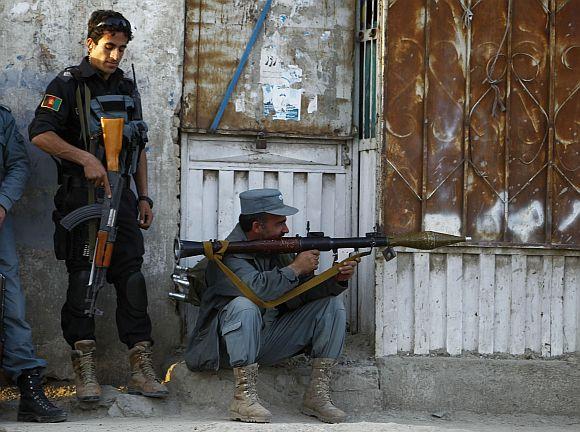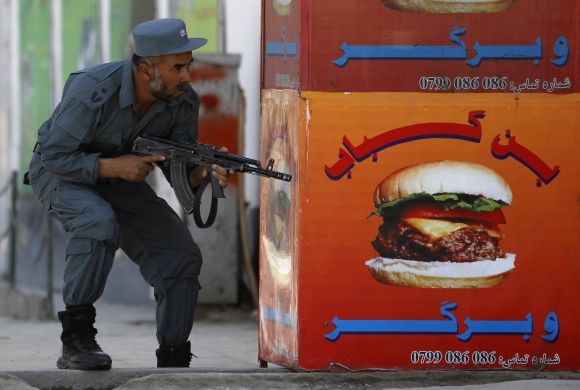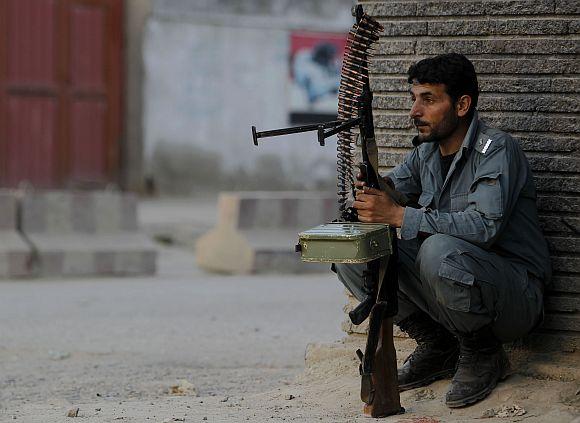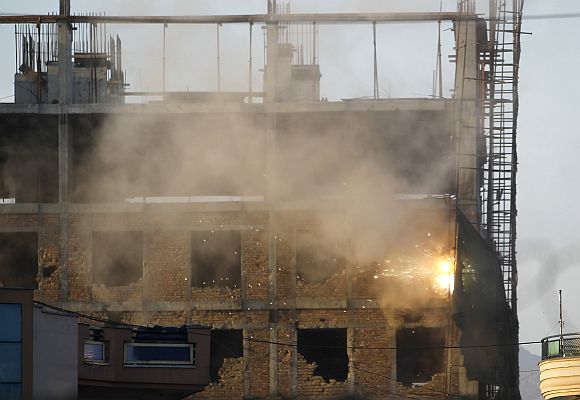
The Taliban once again made their intentions clear on Sunday, with spectacular coordinated attacks which resulted in an 18-hour battle with forces of the North Atlantic Treaty Organisation and Afghanistan. With the looming political uncertainty and whispers of a civil war, the insurgents are well positioned to fill in the vacuum.
The Taliban-led insurgency remains a potent adversary capable of striking at will with huge demonstrative effect, says Shanthie Mariet D Souza
It was the biggest ever attack by the insurgents on capital Kabul, in terms of the number of suicide attackers employed. It was also one of the most audacious and well-coordinated attacks in recent times. On 15 April, simultaneous attacks on the Afghan capital and three other eastern provinces- Nangarhar, Logar and Paktia- left 51 people dead.
It included four civilians, 11 members of the security forces and 36 insurgents. The Taliban announced the launch of its spring offensive and Afghanistan, which had registered some days of peace and tranquillity, has braced itself for another season of bloody violence.
The assaults began simultaneously at 1:45 pm, and residents were quick to discern nearly identical patterns of attack- light gunfire, followed by explosions and protracted fire fights with Afghan security forces, with the militants in several cases fighting from vacant buildings or unfinished construction sites near their main targets.
The spectacular attacks that took almost 18 hours to quell, once again brought to the fore the fragility of transition process based on arbitrary time tables. Coming ahead of the Chicago Summit in May this year, the insurgents have sent a loud and clear message.
By targetting the diplomatic enclave in Kabul's green zone, specifically using enormous fire power, the insurgents managed to underline what President Hamid Karzai later highlighted as 'intelligence failure, specially that of the North Atlantic Treaty Organisation.
In face of a retreating coalition army and waning international interest, the insurgents are indeed well-poised to carry out such attacks in future. The Taliban spokesman who described the onslaught as the opening of the Taliban's spring offensive said, "This is a message to those foreign commanders who claim that the Taliban lost momentum. We just showed that we are here and we will launch and stage attacks whenever we want."
...

In the past year, United States President Obama's announcements of pulling American troops out of Afghanistan have met with several challenges. After recent weeks marred by the attacks on NATO units, riots after American military personnel burned copies of the Holy Koran and the killing of 17 Afghan civilians by an American sergeant, the US relinquished its right to carry out night raids and handed over the main coalition prison to the Afghan government in a bid to move ahead with the convoluted strategic partnership agreement before the Chicago Summit.
However, with the beginning of the so called 'spring offensive', attempts at demonstrating some progress in the Afghan war by the US administration have once again been thrown into a quandary.
In recent times, individual and uncoordinated attempts at negotiations with the Taliban has emerged as the principal conflict management strategy for the US. A political office came up in Qatar in January this year.
Some desperate moves were made to release imprisoned Taliban commanders from the detention centre at Guantanamo bay, failure of which led the Taliban to suspend the peace talks in March.
Efforts, however, have continued to keep the fledging peace process going, both by the US and the Karzai administration. On 14 April, a day before the attack, Salahuddin Rabbani, the son of slain Burhanuddin Rabbani was chosen to lead the 70-member High Peace Council.
The HPC is charged with reaching out to Taliban insurgents. The attacks, the very next day, shows a complete disdain from the insurgents' side to the process of negotiations.
...

Though the Afghan National Security Forces were able to successfully neutralise the insurgents, concerns abound on their capability of gathering adequate intelligence on the planning and execution of such well coordinated multiple sieges.
The fact that the insurgents could slip into the protected city evading several security check points with a huge stockpile of weapons and penetrate the most secure inner circle of Kabul's ring of steel - the Wazir Akbar Khan district- is also a matter of deep worry.
NATO commended Afghan security forces for effectively defending the city and ultimately quelling the attack. But Afghan forces did receive some back-up from helicopters and NATO special forces. The NATO's praise for the ANSF is understandable, for on such success that the exit strategy is predicated.
Afghan officials pointed at the role of Haqqani network, by underlining the pattern of the attacks and area of operations. The Haqqani network was directly involved in one of the last major attacks in Kabul, an assault on the American Embassy in September 2011, and that too involved militants raining down rocket and gunfire from an unfinished building nearby.
The Taliban, however, have indicated that their commander for eastern front Haji Lala was behind the attack. Haji Lala is Taliban's shadow governor for Kabul and is known to be based in the Pakistani city of Peshawar. The coalescence of insurgent factions and movement of armed opposition closer to provinces to Kabul is indicative of things to come this summer.
...

Irrespective of the involvement of particular persons or groups, the attack in a way could also be demonstration of control and displeasure of the insurgents' Pakistani hosts for being sidelined in the peace talks.
Pakistan, which had opted to stay away Bonn Conference hosted by Germany in December 2011 as mark of protest against the US attack on Salala post in Mohmand Agency on 26 November that year, has decided to take part in the upcoming Chicago summit.
However, heightened tensions between US and Pakistan over the issues of the Abbotabad raid last summer, closure of the NATO supply routes and the recent announcement of a $10 million bounty for information leading to the arrest of Lashkar-e-Toiba leader Hafiz Muhammad Saeed have continued.
Pakistan's Parliament last week unanimously voted to forbid the US from conducting drone strikes inside Pakistani territory. There are some signs that the civilian leadership is changing tracks.
But at the same time, there are still indications that there will be attempts by the Pakistani establishment at holding on to their strategic assets to influence the intended outcome in Afghanistan. Any movement towards talks or negotiations in the past have evoked violent retribution. The recent attack could have been part of the same trend.
...

Post-15 April, Kabul may not be turn into an epicentre of insurgent activity. It has remained relatively safe, accounting for less than one percent of violent episodes nationwide. However, the relative safety of the national capital, in no way, marks the success of the stabilisation efforts in Afghanistan.
The Taliban-led insurgency, in spite of the claims of the military weakening, remains a potent adversary capable of striking at will with huge demonstrative effect.
That poses challenges both to the stabilisation of Afghanistan and the transition plans for the present US administration. In a time when President Karzai has announced an early election time table , thereby complicating the already muddled transition process, further
deterioration of security can be the worst possible development.
As the summer sets in, the likelihood of targeted high profile killings combined with spectacular attacks would erode the public confidence. With the looming political uncertainty, whispers of a civil war, the insurgents are well positioned to fill in the vacuum.
Ahead of the Chicago summit in May, there is, thus, a need for a realistic assessment on the 'conditions and needs on the ground' to which the security transition timetables of the coalition forces should be linked.
Dr Shanthie Mariet D'Souza is a Research Fellow at the Institute of South Asian Studies, an autonomous Institute at the National University of Singapore.
...